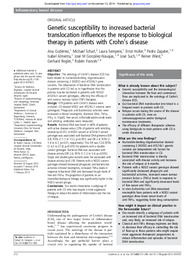Por favor, use este identificador para citar o enlazar este ítem:
https://hdl.handle.net/11000/35485Registro completo de metadatos
| Campo DC | Valor | Lengua/Idioma |
|---|---|---|
| dc.contributor.author | Gutiérrez, Ana | - |
| dc.contributor.author | Scharl, Michael | - |
| dc.contributor.author | Sempere, Laura | - |
| dc.contributor.author | Holler, Ernst | - |
| dc.contributor.author | Zapater, Pedro | - |
| dc.contributor.author | Almenta, Isabel | - |
| dc.contributor.author | González-Navajas, Jose Manuel | - |
| dc.contributor.author | Such, José | - |
| dc.contributor.author | Wiest, Reiner | - |
| dc.contributor.author | Rogler, Gerhard | - |
| dc.contributor.author | Francés, Rubén | - |
| dc.contributor.other | Departamentos de la UMH::Farmacología, Pediatría y Química Orgánica | es_ES |
| dc.date.accessioned | 2025-01-30T07:41:22Z | - |
| dc.date.available | 2025-01-30T07:41:22Z | - |
| dc.date.created | 2014-02 | - |
| dc.identifier.citation | Gut. 2014 Feb;63(2):272-80 | es_ES |
| dc.identifier.issn | 1468-3288 | - |
| dc.identifier.issn | 0017-5749 | - |
| dc.identifier.uri | https://hdl.handle.net/11000/35485 | - |
| dc.description.abstract | Objective: The aetiology of Crohn's disease (CD) has been related to nucleotide-binding oligomerisation domain containing 2 (NOD2) and ATG16L1 gene variants. The observation of bacterial DNA translocation in patients with CD led us to hypothesise that this process may be facilitated in patients with NOD2/ATG16L1-variant genotypes, affecting the efficacy of anti-tumour necrosis factor (TNF) therapies. Design: 179 patients with Crohn's disease were included. CD-related NOD2 and ATG16L1 variants were genotyped. Phagocytic and bactericidal activities were evaluated in blood neutrophils. Bacterial DNA, TNFα, IFNγ, IL-12p40, free serum infliximab/adalimumab levels and antidrug antibodies were measured. Results: Bacterial DNA was found in 44% of patients with active disease versus 23% of patients with remitting disease (p=0.01). A NOD2-variant or ATG16L1-variant genotype was associated with bacterial DNA presence (OR 4.8; 95% CI 1.1 to 13.2; p=0.001; and OR 2.4; 95% CI 1.4 to 4.7; p=0.01, respectively). This OR was 12.6 (95% CI 4.2 to 37.8; p=0.001) for patients with a double-variant genotype. Bacterial DNA was associated with disease activity (OR 2.6; 95% CI 1.3 to 5.4; p=0.005). Single and double-gene variants were not associated with disease activity (p=0.19). Patients with a NOD2-variant genotype showed decreased phagocytic and bactericidal activities in blood neutrophils, increased TNFα levels in response to bacterial DNA and decreased trough levels of free anti-TNFα. The proportion of patients on an intensified biological therapy was significantly higher in the NOD2-variant groups. Conclusions: Our results characterise a subgroup of patients with CD who may require a more aggressive therapy to reduce the extent of inflammation and the risk of relapse. | es_ES |
| dc.format | application/pdf | es_ES |
| dc.format.extent | 10 | es_ES |
| dc.language.iso | eng | es_ES |
| dc.publisher | British Medical Assn | es_ES |
| dc.rights | info:eu-repo/semantics/openAccess | es_ES |
| dc.rights | Attribution-NonCommercial-NoDerivatives 4.0 Internacional | * |
| dc.rights.uri | http://creativecommons.org/licenses/by-nc-nd/4.0/ | * |
| dc.subject | Bacterial Translocation | es_ES |
| dc.subject | Crohn'S Disease | es_ES |
| dc.subject | Ibd - Genetics | es_ES |
| dc.subject | Immune Response | es_ES |
| dc.subject | Infliximab | es_ES |
| dc.title | Genetic susceptibility to increased bacterial translocation influences the response to biological therapy in patients with Crohn’s disease | es_ES |
| dc.type | info:eu-repo/semantics/article | es_ES |
| dc.relation.publisherversion | 10.1136/gutjnl-2012-303557 | es_ES |

Ver/Abrir:
Genetic susceptibility to increased bacterial translocation influences.pdf
1,01 MB
Adobe PDF
Compartir:
 La licencia se describe como: Atribución-NonComercial-NoDerivada 4.0 Internacional.
La licencia se describe como: Atribución-NonComercial-NoDerivada 4.0 Internacional.
.png)